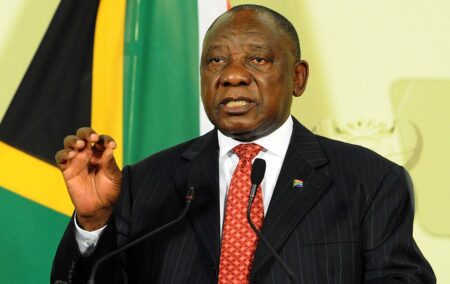Hermann Pretorius
And for that, South Africans should be grateful, and worried.
The presidential question and answer session in the National Assembly of 22 August started with the president making the case that South Africa must attract investment in order to reverse economic decline and the cruel trend of climbing unemployment. The figures of investment mentioned by the president sound promising: foreign direct investment in 2018 was up from 2017’s R27 billion to R70 billion. The government planned to build on its ‘success’ in attracting new investments into South Africa Inc., and a second investment summit in November promised to do this. That was the line the president took. Unfortunately, reality has so far refused to adjust itself accordingly.
In a big-on-bluster, short-on-substance answer to a question by Democratic Alliance leader Mmusi Maimane, Ramaphosa invited Maimane to join him at the November summit so as to hear ‘what the investing world is saying about [ANC] economic policies’. However, Maimane doesn’t have to wait for November. What the investors are saying is loud and clear if you follow the money: 2019 has seen capital flight of more than R100 billion and the trend shows very little sign of slowing, never-mind reversing.
The president was right in his introductory remarks; investment must return and the environment for investors to entrust their money to the country must urgently be created. If only it were the case that, with these words, the president meant that a change in our economic fortunes and trajectory might genuinely be achievable, even imminent. But this is not the case. The president’s much-appreciated clarity in Parliament on Thursday left no room for doubt: Ramaphosa is a man of his word – or rather, words: unfortunately those words are ‘prescribed assets’, ‘expropriation without compensation’, and ‘National Health Insurance’.
Much might be made of the CR17 matters raised by opposition politicians and litres of journalistic ink have already been spent on the issue, but the most striking aspect of the president’s performance was his openness about the ideological direction he wants his government to pursue. The president who hoped to attract investment into the country had sat down; the Ramaphosa who rose to answer questions was the president of a socialist, wealth-extracting, pension fund-raiding government.
He ducked and dived on the issue of ‘prescribed assets’,until finally admitting that the raiding of pension funds by the government to stop the gaps of corruption, maladministration and exorbitant expenditure must be considered a viable policy option.
On the matter of National Health Insurance, the president confirmed his government’s intention to pursue rapid implementation of an expenditure disaster that will end up making Eskom look like a model of managerial prudence.
On the constitutional disaster that is the expropriation of property without compensation, Ramaphosa made no bones about the intention of his government to continue its relentless attack on the ability of South Africans to be the owners of the fruits of their labour.
It boggles the mind that the president can start the session by stating his hopes of attracting investment into the country, only to dash any hopes of its success. He is committing his government to policies that will, with absolute certainty, only accelerate the flight of capital and economic deterioration. When investment goes, so go businesses, jobs, tax revenue, and the ability of the state to provide the expanding, impoverished population of this country with grants to feed their families. Hungry people, as my colleague Ian Cruikshanks always says, become angry people. What this country needs, the president of the introductory remarks knows very well. If that president wanted to serve his country, he would be a man of those words of economic sense, fiscal prudence, and common sense.
Alas, the sounds made in that direction cannot be considered this presidency’s true ambition, as they have been backed up by nothing but gimmicks and tricks signifying nothing. Contrast this to the aggressive policy and legislative pushes to bring about the socialist intentions so clearly stated in the answers the president gave: the NHI is coming, EWC is coming, and the raiding of pension funds through prescribed assets is coming.
South Africans must at long last abandon the image of a well-intentioned reformer hampered by a fractious party. The president is a man of his word. In 2017, he told the SACP that the ‘well-being and prosperity’ of the South African people ‘is inextricably bound to the success of the National Democratic Revolution that we are both committed to pursue’.
Behind the billionaire smile and the ability to jog with the bourgeoisie, there is a socialist telling us that he is coming for what South Africans have earned by the sweat of their brows. It’s time we took him at his word. It’s time to be grateful for his clarity in stating his intentions.
Hermann Pretorius is an analyst and writer at the Institute of Race Relations.
If you like what you have just read, become a Friend of the IRR if you aren’t already one by SMSing your name to 32823 or clicking here. Each SMS costs R1. Terms & Conditions apply.

